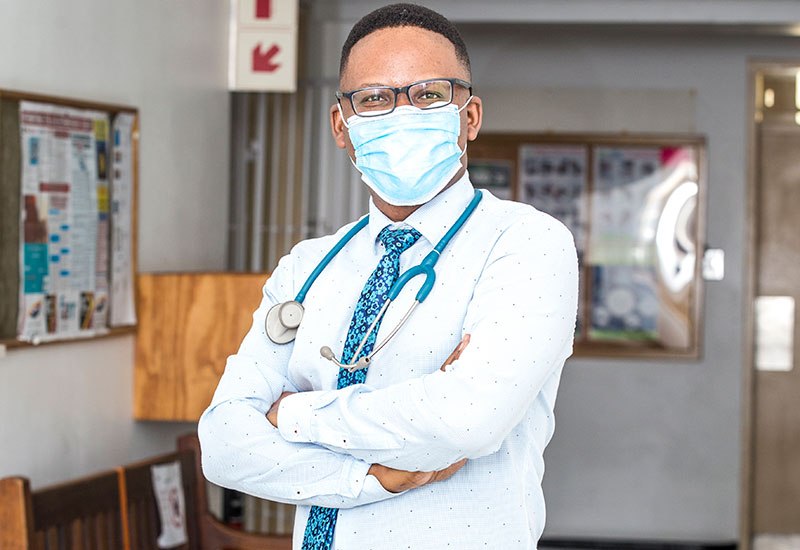UCT lecturer recognised with Western Cape Government service excellence award
26 July 2021 | Story Nicole Forrest. Photos Supplied. Read time 8 min.
Dr Itumeleng Ntatamala, occupational medicine specialist and senior lecturer at the University of Cape Town’s (UCT) Faculty of Health Sciences, was recently awarded silver in the category ‘Inspirational Support Employee’ in the Western Cape Government’s (WCG) 2020 Service Excellence Awards.
According to WCG Director‑General Dr Harry Malila, the awards recognise and acknowledge civil servants who are “living the WCG values” of innovating, responsiveness and caring.
Each of the individuals and teams nominated has worked tirelessly to improve the living conditions of ordinary citizens, serving with integrity and care, and showing the true value of living by the batho pele (people first) principles. And Dr Ntatamala is no exception.
A desire to help
A specialist in occupational health, a branch of medicine that is primarily concerned with the relationship between work and health, Ntatamala has made it his life’s mission to educate employers, employees and fellow health professionals on the relationship between work and health.
Although it is less well known than other medical specialities, Ntatamala noted that early on in his medical training he knew occupational health was the path he wanted to follow.
“The occupational health bug bit me during my undergraduate training, when we were introduced to the concept of work and health by Professor Shahieda Adams. I found it fascinating that medical doctors could actually leave the hospital and go out into workplaces to assess the risks that workers were exposed to, and help prevent them from getting injured or ill by putting proper measures and controls in place,” he said.
After graduating from UCT, Ntatamala completed his internship in Mokopane, a small rural mining town in Limpopo. There, while diagnosing and treating ex‑miners and domestic workers for respiratory conditions aggravated by their work, he grew eager to study further in order to develop the skills necessary to assist other healthcare providers with managing occupational health conditions.
A systematic approach
On obtaining his master’s in occupational health at the University of Birmingham in the United Kingdom through the Chevening Scholarship, Ntatamala returned to Cape Town to train as an occupational medicine registrar in UCT’s Division of Occupational Medicine.
Since his placement at Groote Schuur Hospital and the Department of Health’s Health Impact Assessment Unit, Ntatamala and his colleagues have been instrumental in setting up occupational health and safety systems that have reconfigured governance structures in the Department of Health. Although challenging at times, this has been highly rewarding work for the doctor.
“Pre‑pandemic, there were limited occupational health resources available, as well as limited understanding of the importance of occupational health by some within the department. As COVID‑19’s impact on health workers became apparent, we pulled together resources to try and make these systems responsive to the needs of all workers,” Ntatamala explained.

In addition to making the reporting and response of occupational injuries and diseases more efficient, the systems have had a massive effect on the government’s ability to respond to COVID‑19.
“These systems have helped give healthcare workers on the ground access to decision makers. Senior departmental management, with the support of occupational medicine specialists and registrars, can now work collaboratively with various stakeholders to rapidly address occupational health and safety concerns.”
It’s all about balance
The WCG recognised Ntatamala for going “beyond the call of duty” in carrying out his activities. In this regard, he said it is essential to have a well thought‑out plan, and keep the lines of communication with co‑workers open.
“When approaching large projects, it’s important to understand what needs to get done, how important or urgent each task is, and then prioritise each activity. Open and clear communication with one’s team members is key. I find great joy in working with others, and engaging with team members often helps to distil ideas and find novel solutions.”
“Open and clear communication with one’s team members is key.”
Beyond this, Ntatamala pointed out that keeping a balanced and active lifestyle can make going the extra mile a little less strenuous.
“Taking time for yourself away from work to rest and rejuvenate – alone, and with loved ones – is key to maintaining one’s own health and wellness. You also have to try your level best to maintain a balanced diet and regular exercise!” he advised.
If accolades are anything to go by, this is a strategy that works. In addition to the 2020 Service Excellence Award, Ntatamala has been the recipient of the Chevening Scholarship, and made it onto the list of Mail & Guardian’s 200 Young South Africans in 2019.
This recognition, he remarked, is testimony to the fact that he is on the right track both personally and professionally.
“On a personal level, these honours are affirmation that one is on the right track. They are an indication that you should forge on in doing your best to help improve [the] lives of the patients and communities we serve.
“Working in a relatively smaller and less well‑known field within medicine means that these honours and awards bear testament to the importance of the work that my colleagues and I do daily to improve the health and safety of working populations.”
Onwards and upwards
Although the pandemic has presented plenty of challenges for healthcare systems globally, particularly as they relate to occupational health and safety, Ntatamala said that it also presents opportunities.
“Many workplaces were ill‑prepared; however, this opened up new possibilities, and a shift from ‘business as usual’. Many employers have come to appreciate their duty to maintain a safe and healthy environment.
“The pandemic has certainly helped many workplaces become proactive in preventing occupational injuries and diseases, including the impact of these on their operations. Though there is still a very long way to go, it has been encouraging to observe how the health of workers has made it to the top of the list of concerns in many organisations.”
“Many employers have come to appreciate their duty to maintain a safe and healthy environment.”
In addition to positive changes to the field of occupational health, Ntatamala is excited about his new journey as an occupational medicine specialist and senior lecturer in the Division of Occupational Medicine at UCT’s School of Public Health and Family Medicine.
This new venture is a perfect complement to his passion for helping others develop, an interest that has seen Ntatamala take part in the Faculty of Health Sciences MBChB mentorship programme since 2017, and initiate the first occupational health elective for fifth- and sixth‑year medical students.
“I hope to become a seasoned researcher in the occupational and environmental health space.”
As assistant convenor of the postgraduate diploma in occupational health, and co‑developer of short courses in occupational health, he hopes to continue to strengthen his and others’ knowledge of the field.
“I look forward to this next phase, where my focus will be training undergraduate students on occupational health, and improving access to postgraduate training in occupational health.
“I hope to become a seasoned researcher in the occupational and environmental health space, and have enrolled for a PhD in Public Health – which will be crucial in sharpening my existing skills, and ensuring that impactful, locally relevant research continues to come out of UCT,” he added.
 This work is licensed under a Creative Commons Attribution-NoDerivatives 4.0 International License.
This work is licensed under a Creative Commons Attribution-NoDerivatives 4.0 International License.
Please view the republishing articles page for more information.










